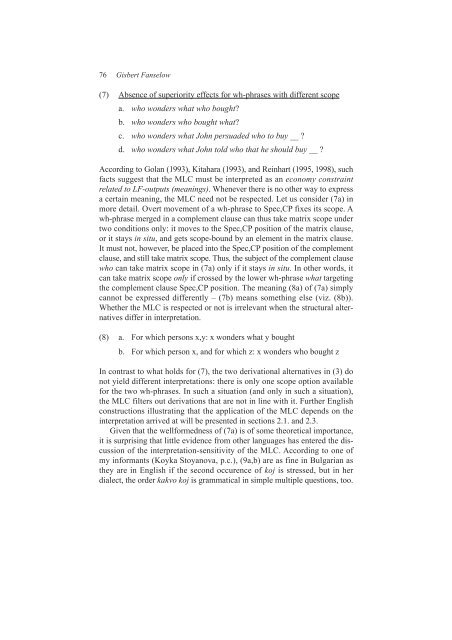Minimality Effects in Syntax · The MLC and Derivational Economy ...
Minimality Effects in Syntax · The MLC and Derivational Economy ...
Minimality Effects in Syntax · The MLC and Derivational Economy ...
You also want an ePaper? Increase the reach of your titles
YUMPU automatically turns print PDFs into web optimized ePapers that Google loves.
76 Gisbert Fanselow<br />
(7) Absence of superiority effects for wh-phrases with different scope<br />
a. who wonders what who bought?<br />
b. who wonders who bought what?<br />
c. who wonders what John persuaded who to buy __ ?<br />
d. who wonders what John told who that he should buy __ ?<br />
Accord<strong>in</strong>g to Golan (1993), Kitahara (1993), <strong>and</strong> Re<strong>in</strong>hart (1995, 1998), such<br />
facts suggest that the <strong>MLC</strong> must be <strong>in</strong>terpreted as an economy constra<strong>in</strong>t<br />
related to LF-outputs (mean<strong>in</strong>gs). Whenever there is no other way to express<br />
a certa<strong>in</strong> mean<strong>in</strong>g, the <strong>MLC</strong> need not be respected. Let us consider (7a) <strong>in</strong><br />
more detail. Overt movement of a wh-phrase to Spec,CP fixes its scope. A<br />
wh-phrase merged <strong>in</strong> a complement clause can thus take matrix scope under<br />
two conditions only: it moves to the Spec,CP position of the matrix clause,<br />
or it stays <strong>in</strong> situ, <strong>and</strong> gets scope-bound by an element <strong>in</strong> the matrix clause.<br />
It must not, however, be placed <strong>in</strong>to the Spec,CP position of the complement<br />
clause, <strong>and</strong> still take matrix scope. Thus, the subject of the complement clause<br />
who can take matrix scope <strong>in</strong> (7a) only if it stays <strong>in</strong> situ. In other words, it<br />
can take matrix scope only if crossed by the lower wh-phrase what target<strong>in</strong>g<br />
the complement clause Spec,CP position. <strong>The</strong> mean<strong>in</strong>g (8a) of (7a) simply<br />
cannot be expressed differently – (7b) means someth<strong>in</strong>g else (viz. (8b)).<br />
Whether the <strong>MLC</strong> is respected or not is irrelevant when the structural alternatives<br />
differ <strong>in</strong> <strong>in</strong>terpretation.<br />
(8) a.For which persons x,y: x wonders what y bought<br />
b.For which person x, <strong>and</strong> for which z: x wonders who bought z<br />
In contrast to what holds for (7), the two derivational alternatives <strong>in</strong> (3) do<br />
not yield different <strong>in</strong>terpretations: there is only one scope option available<br />
for the two wh-phrases. In such a situation (<strong>and</strong> only <strong>in</strong> such a situation),<br />
the <strong>MLC</strong> filters out derivations that are not <strong>in</strong> l<strong>in</strong>e with it. Further English<br />
constructions illustrat<strong>in</strong>g that the application of the <strong>MLC</strong> depends on the<br />
<strong>in</strong>terpretation arrived at will be presented <strong>in</strong> sections 2.1. <strong>and</strong> 2.3.<br />
Given that the wellformedness of (7a) is of some theoretical importance,<br />
it is surpris<strong>in</strong>g that little evidence from other languages has entered the discussion<br />
of the <strong>in</strong>terpretation-sensitivity of the <strong>MLC</strong>. Accord<strong>in</strong>g to one of<br />
my <strong>in</strong>formants (Koyka Stoyanova, p.c.), (9a,b) are as f<strong>in</strong>e <strong>in</strong> Bulgarian as<br />
they are <strong>in</strong> English if the second occurence of koj is stressed, but <strong>in</strong> her<br />
dialect, the order kakvo koj is grammatical <strong>in</strong> simple multiple questions, too.
















